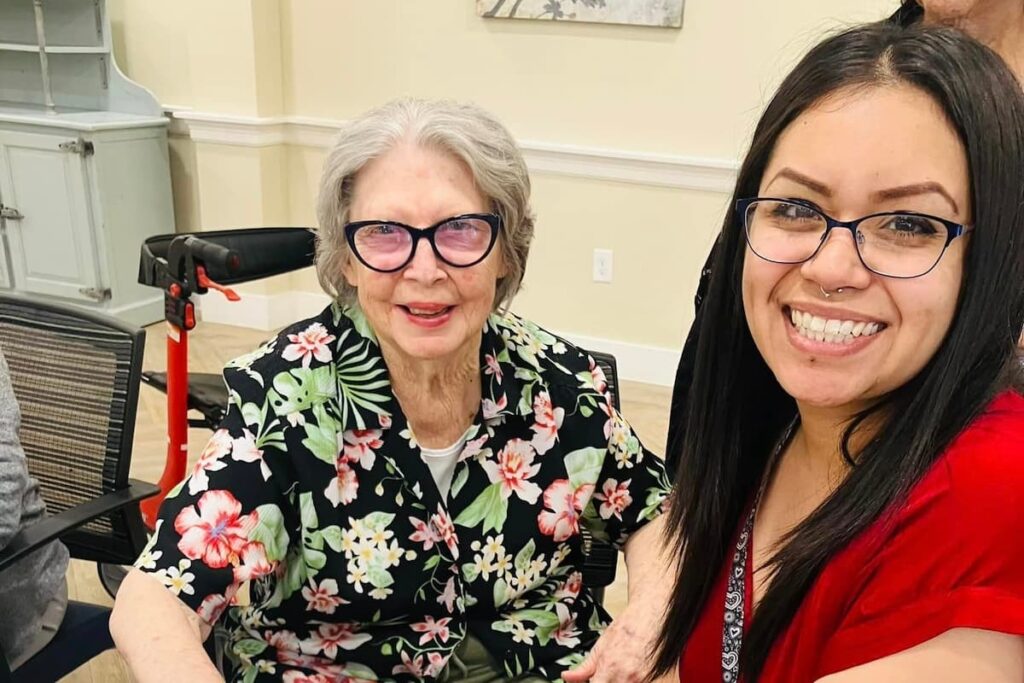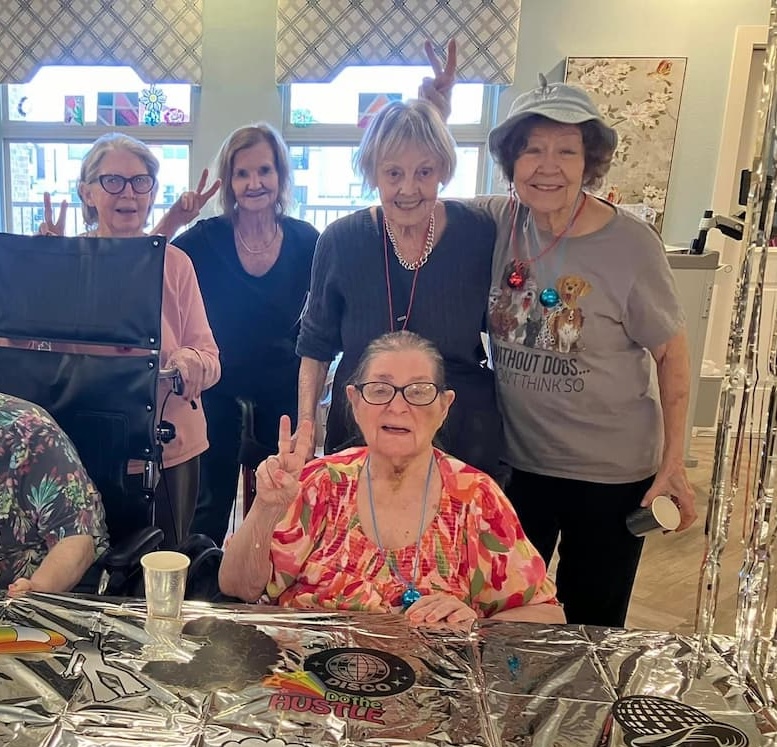A dementia diagnosis can create feelings of fear and uncertainty, leaving family members grappling with their emotions. The initial shock may lead to sadness, frustration, or even helplessness as you confront an unknown future. But once the dust settles, our memory care experts at Buda Oaks Assisted Living and Memory Care recommend a little myth-busting.

What does that mean, exactly?
There’s a lot of misinformation out there. To ease your burden, address myths about dementia that can cloud your decision-making process. Understanding how this condition impacts your loved one and trying to choose appropriate care options is challenging enough without being led down the wrong path. We have the information you need to make educated decisions and break the stigma that surrounds memory loss.
The Four Most Common Myths About Dementia
1. Dementia is a Normal Part of Aging
Dementia represents a decline in cognitive function that interferes with daily living.
While age is a significant risk factor for dementia, it is not a normal part of the aging process. Many older adults remain cognitively healthy and lead fulfilling lives without experiencing memory loss. The National Institutes of Health reports that one out of every seven Americans age 71 and up have some form of dementia.
2. Dementia Only Affects Memory
Many people believe that dementia solely impacts memory. While memory loss is one of the hallmark symptoms, dementia encompasses a variety of cognitive impairments. Your loved one could have difficulties with:
- Language
- Problem-solving
- Reasoning
- Judgment
Additionally, individuals with dementia may experience changes in mood, personality, and behavior. Once you learn this broader range of symptoms, you’ll know what to expect.
3. Individuals with Dementia Are Always Confused and Unaware of Their Surroundings
One of the other common myths about dementia is that individuals with cognitive impairment are constantly confused and unable to understand their environment. While confusion can occur, many individuals with dementia retain the ability to recognize familiar faces, places, and memories, particularly when they are in the earlier stages. They may have lucid moments where they are aware of their surroundings.
4. There is No Hope for People with Dementia
Some individuals believe that a dementia diagnosis means losing hope. While dementia is a progressive condition, early diagnosis and appropriate interventions can help manage symptoms and improve quality of life.
Various treatments, therapies, and lifestyle changes can make a positive difference.* It’s important to engage with them respectfully and remember that they can still connect emotionally, even if they struggle with cognitive tasks.
Clinging to myths of dementia can hinder your understanding of the condition. In truth, many see seniors with dementia retain skills and emotions that can be embraced and nurtured in a caring environment.
Educating Yourself About Dementia Symptoms
In addition to busting the common myths about dementia, we suggest learning about the stages of dementia. Understanding symptom progression can significantly affect how you relate to your loved one.
According to the Alzheimer’s Association®, people experience these stages in different ways. Here is the typical progression:
Early-stage Alzheimer’s (mild)
The individual may be able to function independently at this stage, being able to drive and enjoy social interactions. These are the symptoms to be aware of:
- Forgetting names and words
- Trouble organizing and planning
- Challenges in performing tasks
- Losing valuable objects
Middle-stage Alzheimer’s (moderate)
This stage can last for several years and may require a higher care level.
- Unexpected behaviors, like refusing to take showers
- Confusing words
- More challenges performing routine tasks
- Problems expressing thoughts and recalling personal information
- Changes in sleep patterns
- Confusion about time and place
- Increased episodes of wandering and getting lost
Late-stage Alzheimer’s (severe)
Dementia symptoms become most severe in this stage.
- Unaware of surroundings
- Unable to control movements
- Cannot have conversations
- Changes in physical abilities, like walking or swallowing
- Require around-the-clock assistance
During the late stage, people with Alzheimer’s may not be able to initiate engagement. However, they can still benefit from appropriate interactions, like listening to music or receiving reassurance through gentle touch.
How do you know when someone needs memory care?
If you are wondering how to know when memory care is needed, be aware of the symptoms listed above and evaluate your loved one’s safety and well-being. If you worry they might leave the stove on, aren’t taking their medications, aren’t eating, or don’t remember their name or where they are, we recommend a doctor visit. A medical evaluation can clarify things and lead to the next step: memory loss caregiving.
Introducing Buda Oaks Assisted Living and Memory Care
The Retreat at Buda Oaks offers compassionate, nurturing care for seniors with memory loss. Every individual deserves care customized to their needs, and our services enrich lives and provide peace of mind to families.
The Buda Oaks team prioritizes personalized care, focusing on preserving independence and dignity. Daily routines at Buda Oaks create stability and comfort, allowing residents to flourish in an understanding environment.
Our Memory Care Services
The memory care services at Buda Oaks promote cognitive health and encourage social interactions among residents. Every aspect of care is tailored to each individual’s unique needs. Our highly specialized caregivers cultivate an atmosphere of compassion and respect; the organized activities promote physical, mental, and emotional well-being, creating opportunities for connection and community involvement.
Our environment features calming spaces designed for relaxation and comfort alongside stimulating activities like art therapy, music sessions, and exercise programs. These activities aim to enhance cognitive functions and elevate overall quality of life. The focus goes beyond mere care—every effort promotes times of joy and connection, no matter how difficult some days may be.
Let Buda Oaks Be Your Partner in Memory Care
Our compassionate team members empathize with the emotional toll that finding dementia care can take. We will support you through the process and ensure your loved one is treated with respect and understanding. Contact us, and we’ll help you create a brighter future for your family.
*This article should not replace medical advice. Talk with your doctor regarding any issues you may experience, especially if you suspect memory loss, dementia, or Alzheimer’s.

